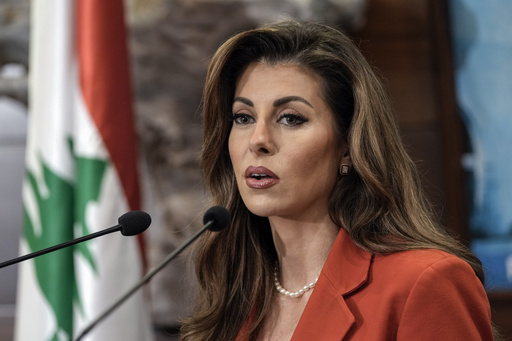
BEIRUT — A recently appointed U.S. diplomatic representative expressed hope on Friday that the Lebanese government would ensure that Hezbollah, the militant group, remains excluded from any governmental role.
Morgan Ortagus, a former spokesperson for the State Department and a U.S. Navy Reservist, has taken on the responsibilities of deputy special envoy for Middle East peace. She steps into this role following the tenure of Amos Hochstein, who played a vital part in negotiating a ceasefire that concluded a prolonged conflict lasting 14 months between Israel and Hezbollah.
During a press briefing held after her discussions with President Joseph Aoun of Lebanon, Ortagus thanked Israel for its efforts against Hezbollah. She commended Aoun, along with Prime Minister-designate Nawaf Salam and the rest of the Lebanese government, for their dedication to eradicating corruption and implementing necessary reforms, as well as their resolve to keep Hezbollah from being involved in governmental affairs.
“The United States has established firm boundaries, stating that Hezbollah will not be allowed to intimidate the Lebanese public, particularly through inclusion in the government,” she remarked.
In response to Ortagus’ statements, the Lebanese presidential office issued a statement on X, emphasizing that her comments reflect her personal views and that the presidency is not obligated to engage with them.
Nawaf Salam, recognized as a diplomat and former judge at the International Court of Justice, has been named prime minister-designate by Lebanese parliamentarians, with the responsibility of forming a government while the country has been without a functional administration since 2022.
Even though Salam has expressed his intention to establish a government, efforts have been stalled due to Lebanon’s sectarian power-sharing structure, which divides crucial positions among the Christian, Shiite, and Sunni factions. Prominent blocs, such as Hezbollah and the Amal Movement (representing Shiite interests) and the Lebanese Forces (for Christians), are pressing for their shares of ministerial roles.
As per the ceasefire terms, the previously established deadline for Israeli forces to withdraw from southern Lebanon, which was set for January 26, has now been extended to February 18. Additionally, Hezbollah is required to pull back north of the Litani River, creating a designated zone free of non-state armed factions.
Lebanese armed forces and United Nations peacekeepers are set to operate in the region, yet Israel has voiced concerns about the slow deployment of Lebanese troops, while Lebanon asserts that Israel’s failure to withdraw expediently has hampered its own progress.
The ceasefire is being monitored by a U.S.-led International Monitoring and Implementation Mechanism, which includes delegates from Israel, Lebanon, France, and the U.N. Interim Force in Lebanon (UNIFIL). Nonetheless, Lebanon has accused Israel of perpetrating numerous violations of the ceasefire terms.
During the meeting between Aoun and Ortagus, an Israeli airstrike occurred in the Sidon region, located to the north of the Litani River. Details regarding the target of the strike were unclear, and there was no immediate commentary from the Israeli military.
On the previous evening, the Israeli military reported targeting “two military sites housing Hezbollah weapons, violating the ceasefire agreement.” There were no reports of casualties from the recent strike or from the wave of airstrikes that affected eastern and southern Lebanon the day before.

